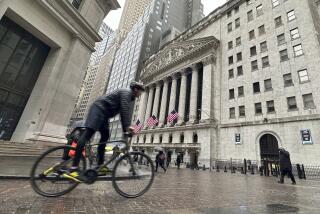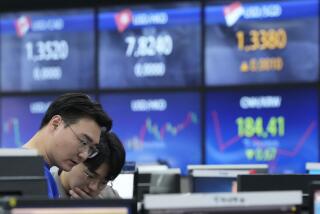Stocks gain a day after Nasdaq trading shutdown
NEW YORK — Investors shook off the after-effects of the Nasdaq Stock Market’s three-hour outage, which rattled investor confidence in high-speed electronic trading, and spurred the major indexes to a second straight day of gains Friday.
Nasdaq’s technical snafu, dubbed a flash freeze, renewed fears of Wall Street technology run amok, but investor worries seemed to ebb.
On Friday, Robert Greifeld, chief executive of the exchange’s parent company, Nasdaq OMX Group Inc., defended the company’s response and declared the exchange “came back successfully” from Thursday’s outage.
But that didn’t quell such critics as U.S. Sen. Mark Warner, who called the glitch “troubling.” He urged the Securities and Exchange Commission in a letter Friday to conduct a “thorough investigation.”
For the week, the major U.S. indexes barely budged despite the flash freeze and the release of minutes from the last Federal Reserve meeting, which showed that policymakers saw the market aligned with them in expecting the central bank to start reducing its $85 billion in monthly bond purchases.
The Dow Jones industrial average slipped 0.5% this week, while the broader Standard & Poor’s 500 rose 0.5%. The Nasdaq composite index fared better, gaining 1.5% over the last five days.
Analysts predicted potentially wilder market swings as the Fed’s meeting in mid-September gets closer.
Investors have been focused on when the Fed starts tapering its monthly purchases and by how much. The bond-buying has helped to keep a lid on long-term interest rates, aiding the housing market’s recovery and the stock market’s strong rally.
For the year, the Dow rose nearly 15% by Friday’s close. Still, for August the blue-chip index was down 3% so far.
“We have a market that has moved up very quickly, very fast,” said Quincy Krosby, a market strategist at Prudential Financial. “Markets like that are always looking for, ultimately, a reason to pull back.”
The Fed’s minutes, released Wednesday, did not show a firm consensus among Fed officials about the continued strength of the nation’s economy.
Bond investors initially took the minutes as a clear sign that the Fed would soon taper. Yields on the benchmark 10-year Treasury bond jumped to 2.89% on Wednesday from 2.81% the day before. Yields, which move in the opposite direction of prices, have since declined.
“The Fed has to begin at some point. It’s never going to be a good time,” Krosby said. “The question for all markets is: How much and when?”
The stock market’s reaction to the Fed’s minutes and to Nasdaq’s outage was somewhat muted. After falling slightly Wednesday, stocks rose Thursday and again Friday.
The Dow rose 46.77 points, or 0.3%, to 15,010.51 on Friday. The S&P; index gained 6.54, or 0.4%, to 1,663.50; and the technology-laden Nasdaq index rose 19.08, or 0.5%, to 3,657.79.
Nasdaq’s Greifeld defended the exchange’s decision to halt trading in Nasdaq-listed securities after a breakdown with a crucial market data feed used by all exchanges. Retail and professional investors alike were protected, he said in a CNBC interview Friday.
“No trading happened,” Greifeld said. “It was a regulatory halt. So nobody was relatively advantaged or disadvantaged. Everybody was on the same footing.”
The outage, from 9:14 a.m. to 12:25 p.m. Pacific time Thursday, was the latest of several alarming technological meltdowns on Wall Street in recent years. It was the second major blow-up for the Nasdaq, which bungled Facebook’s initial public offering last year.
Nasdaq’s shutdown Thursday prompted calls for regulatory reform in Washington, one from Warner, a Democrat from Virginia who is a member of the Senate Banking Committee.
“Such glitches have serious consequences,” Warner, a former venture capitalist, wrote in a letter to SEC Chairwoman Mary Jo White.
“When an exchange fails to function properly ... this type of event impedes our economy by eroding consumer confidence,” he said. “In turn, retail investors are discouraged from participating in capital markets, thereby worsening liquidity and depriving entrepreneurs of capital needed to innovate and grow fledgling companies.”
An SEC spokeswoman declined to say whether the regulator was investigating Nasdaq’s outage. But White, in a statement late Thursday, said the SEC would push to strengthen market safeguards.
“The continuous and orderly functioning of the securities markets is critically important to the health of our financial system and the confidence of investors,” White said.
Jim Puzzanghera in Washington contributed to this report.






